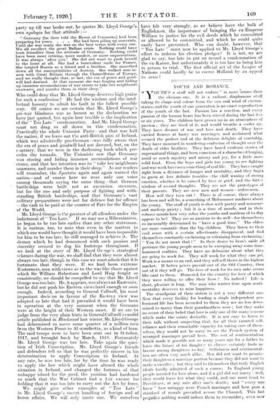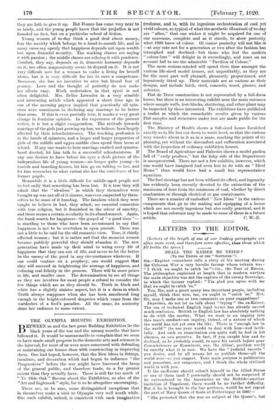YOUTH AND ROMANCE.
y01 71-1-S a stuff will not endure " in more *senses than the obvious one. It is a radiant, diaphanous stuff taking its shape and colour from the sun and wind of eiremn- stance, and the youth of one generation is no exact reproduction of the youth of the last.. Passion has a reaction, and every passion of the human heart has been stirred during the last five or six years. The children have grown up in an atmosphere of passion ; they are tired of it, and would breathe a cooler air. They have dreamt of war and love and death. They have carried flowers at hasty war marriages, and acclaimed what scented the perfect end of the delirious delights of courtship. They have mourned in wondering confusion of thought over the death of elder brothers. They have heard exultant stories of supernatural things, and been conscious of a shamefaced longing, amid so much mystery and misery and joy, for a little more solid food. Even the boys and girls too young to see fighting and war work have seen something of real life. They have caught sight front a distance of hunger and mortality, and they begin to guess at less definite troubles—the chill waning of strong emotion, whether it be caused by love or grief, and the bitter wisdom of second thoughts. They are not the prototypes of their parents. They are new men and women—unforeseen.
How will they turn out ? There is of course, there always has been and will be, a something of Midsummer madness about the young. The stuff of youth is shot with poetry and nonsense and madcap gaiety ; but it is a time of moods, and in their soberer moods how very sober the youths and maidens of to-day appear to be! They are so anxious to do well—for themselves; so inexorably determined to " have a good time." The elder.= are more romantic than the big children. They listen to their cool sense with a certain affectionate disapproval, and find themselves constantly exclaiming or refraining from exclaiming : " You do not mean that !" In their desire to brush aside all pretence the young people scent to be sweeping away some time- honoured realities. They have no delusions about what they are going to work for. They will work for what they can get. Work is a means to an end, and they will sell theirs in the highest market. If better prices prevail out of the Old Country, then out of it they will go. The love of work for its own sake seems like cant to them. Homesick for the country for love of which they were willing to offer their lives ? No indeed ! Life is short, pleasure is long. The man who wastes time upon senti- mentality deserves to miss happiness.
The standpoint of their sisters is not a very different. one- Now that every facility for leading a single independent pro- fessional life has been accorded to them they are no less deter- mined to marry than their grandmothers were ; but they make no secret of their belief that love is only one of the many reasons which make the estate desirable. It is not easy to listen to their talk without suspecting that, for all their vaunted self- reliance and their remarkable capacity for taking care of them- selves, they would not be sorry to see the French system of arranged marriages prevail here. The sort of sentimentalism which made it possible not so many years ago for a father to leave the future of his daughter to chance certainly finds no favour among daughters to-day. Selfishness and sentimental- ism arc often very much alike. Men did not want to promise their daughters a marriage portion because they did not want to make a sacrifice ; but they said to themselves that truly English ideals hardly admitted of such a course. In England young people married for love alone, and if a girl did not marry—well, they would leave her what they could, and one must trust to Providence, at any rate after one's death ; and " every one knew " how unhappy were French marriages and how poor a standard of morals prevailed across the Channel. This last prejudice nothing would induce them to reconsider; even now
they are loth to give it up. But France has come very near to us lately, and the young people know that the prejudice is not founded on fact, but on a particular school of fiction.
Young women of to-day think a good deal about money, fear the anxiety which belongs to a hand-to-mouth life, and in many cases say openly that happiness depends not upon wealth but upon financial security. The working classes are saying it with passion ; the middle classes are echoing it with prudence. Comfort, they say, depends on it, domestic harmony depends on it, too often magnanimity seems to depend on it. It is not very difficult now for a woman to make a living for herself alone, but it is very difficult for her to save a competence. Moreover, she has no incentive to save but literal fear of penury. Love and the thought of posterity do not make her efforts easy. Work undertaken in that spirit is not often delightful. Mrs. Belloc Lowndes in a very sensible and interesting article which appeared a short time ago in one of the morning papers implied that practically all spin- sters were unanimous in declaring any marriage to be better than none. If this is even partially true, it marks a very great change in feminine opinion. In the experience of the present writer, it is but a slight exaggeration. The attitude towards marriage of the girls just growing up has, we believe, beerilargely affected by their schoolmistresses. The teaching profession is in the hands of spinsters, and a larger and larger proportion of girls of the middle and upper-middle class spend their teens at school. If any ono wants to hear marriage exalted and spinster- hood decried, let him talk to a successful schoolmistress. If any one desires to have before his eyes a drab picture of the independent life of young women—no longer quite young—in hostels and boarding-houses, let him go on talking to her, and let him remember to what extent she has the confidence of her former pupils.
Meanwhile it is a little difficult for middle-aged people not to feel sadly that something has been lost. It is true they will admit that the " idealism " in which they themselves were brought up was not all of it sincere, was even suspected by them- selves to be some of it humbug. The fatalism which they were taught to believe in had, they admit, no essential connexion with true religion, but it flourished in the odour of sanctity, and there seems a certain secularity in its abandonment. Again, the frank search for happiness—the gospel of " a good time"— is startling to those who have been accustomed to say that happiness is not to be overtaken in open pursuit. There was not a little to be said for the old romantic view. True, it chiefly affected women ; but it is rather sad that the moment women became publicly powerful they should abandon it. The new generation have made up their mind to wring every bit of happiness that they can out of life, and never to let the better be the enemy of the good in any circumstances whatever. If one could venture on a prophecy, one would suggest that they will succeed in heightening the average of happiness, and reducing real felicity in the process. There will be more prizes in life, and smaller ones. The determination to see all things as they are involves for moat people a refusal to consider the few things which are as they should be. Truth in black and white has a slightly sinister aspect, but it is a dress in which Truth always reappears when she has been smothered kng enough in the bright-coloured draperies which come from the wardrobes of a fool's paradise. All the same, its austerity dims her radiance to some extent.







































 Previous page
Previous page